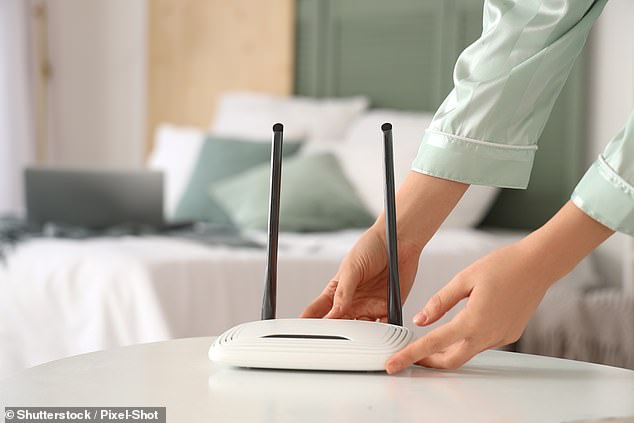- Camilla Thompson is Australia’s leading biohacker and a qualified nutritionist
- She is the brains behind BiohackMe and works with Australia’s elite
- She previously reduced her biological age by 10 years. Read about it here
We are all walking around with a toxic load.
Every day, we’re exposed to chemicals in our air, water, food, and household products. Some of us feel the effects more than others, but make no mistake – our bodies are working overtime to process and eliminate these toxins.
I know this firsthand. After living in mould for years, my body hit a breaking point. I developed chemical sensitivity, meaning I react to everyday products that most people don’t even think about – cleaning sprays, synthetic fragrances, plastics, and more.
This forced me to radically change my environment and rethink everything I bring into my home.
Chemical sensitivity is when the body struggles to detoxify chemicals efficiently, leading to symptoms like headaches, fatigue, skin rashes, and brain fog.
The accumulation of toxins over time can also contribute to more serious conditions, including autoimmune diseases, hormonal imbalances, and even cancer. So, reducing toxic exposure isn’t just a wellness trend – it’s essential for long-term health.
Your home should be your haven – yet hidden toxins, EMFs, and environmental stressors could be silently ageing you and increasing your risk of chronic disease.
The good news? Small swaps can have a big impact on your health and your body knows how to detox these toxins out if you help it.


Plastic Chopping Boards → Grab a bamboo or wooden board from a budget-friendly retailer.
Non-Toxic Cookware → Cast iron and stainless steel options are available at affordable prices.
Water Filtration → A simple charcoal stick filter can help purify water without a pricey system.
Mould Prevention → Keep air circulating and find an affordable dehumidifier.
EMF Reduction → Switch off Wi-Fi at night, put your phone on airplane mode, and use an outlet timer to automate it.
Mattresses & Bedding → Look for organic options on sale and use a non-toxic mattress protector.
Cleaning Products → Supermarkets now stock great non-toxic brands like Koh.
Air Quality → Buy affordable houseplants and/or find reasonably priced HEPA filters.

Food Storage → Repurpose glass jars instead of buying new containers.
Lighting → Swap bright white bulbs for warm LED lights and use blackout curtains for better sleep.
1. Swap plastic chopping boards for bamboo or wood
Those plastic chopping boards? Ditch ’em. They’re a sneaky culprit, leaching microplastics and harbouring bacteria in knife grooves. Research has linked microplastic ingestion to endocrine disruption and increased inflammation. Switch to bamboo or wooden boards, which are naturally antimicrobial and won’t add to your toxin load.
2. Upgrade to non-toxic cookware
While certain pans might make flipping eggs easier, they may release harmful chemicals that when heated are linked to cancer and hormone disruption. Studies have shown that these ‘forever chemicals’ can contribute to liver damage, immune dysfunction, and certain cancers.
Opt for cast iron, ceramic, or stainless steel cookware for a chemical-free kitchen.
3. Filter your tap water
Heavy metals, chlorine, fluoride, and even microplastics are lurking in your tap water. Research links prolonged exposure to heavy metals with neurological damage and kidney disease. ‘Forever chemicals’ like PFAS (per- and polyfluoroalkyl substances, yep what a mouthful) have also been found in drinking water and are linked to cancer, thyroid issues, and immune suppression. A high-quality reverse osmosis system can remove contaminants and give you purer, healthier hydration.
4. Eliminate hidden mould and humidity
Mould is sneaky, and trust me, you don’t want it lurking in your home. It can wreak havoc on your immune system and brain function. Keep humidity levels below 50 per cent with a dehumidifier and ensure good ventilation.
Mould loves dust, so keep your house dust free especially window sills where moisture and dust can collect. If you suspect hidden mould, professional testing and remediation are a must.
Carpets trap dust, allergens, VOCs (volatile organic compounds), and even microplastics, contributing to respiratory issues and indoor air pollution. Synthetic carpets may also off-gas toxic chemicals.
Opt for low-VOC natural fibre carpets (like wool) or hard flooring alternatives such as timber or tile. Regular vacuuming with a HEPA-filtered vacuum reduces dust and allergen buildup.

5. Swap out body products with harmful chemicals for natural alternatives
Many conventional body care products contain parabens, sulphates, phthalates, and synthetic fragrances that can disrupt hormones and contribute to long-term health issues.
Research on parabens and cancer suggests their potential role in tumour growth, while sulphates have been linked to skin irritation and cellular damage. Choose natural skincare, deodorants, and hair care products free from toxins. There are heaps of affordable options in supermarkets and chemists.
6. Reduce EMF exposure
Time to put on the tin hat – but seriously! Wi-Fi routers, smart meters, and electronics constantly emit electromagnetic fields (EMFs) and studies suggest that prolonged EMF exposure may contribute to oxidative stress.
Reduce your exposure by switching off Wi-Fi at night, putting your phone on airplane mode, using ethernet connections where possible, and keeping electronics out of the bedroom.
7. Switch to natural fabric mattresses and bedding
Some mattresses contain flame retardants and volatile organic compounds (VOCs) that off-gas into the air while you sleep.
Opt for organic latex, wool mattresses, and breathable natural-fibre bedding like bamboo for better rest and reduced toxin exposure.

8. Say no to toxic cleaning products
Conventional cleaning products often contain formaldehyde, ammonia, and bleach, which can irritate the lungs and trigger chronic inflammation.
Research has linked frequent exposure to household cleaning chemicals with an increased risk of respiratory diseases and hormone disruption. Supermarkets now stock great non-toxic brands making it easier than ever to switch.
9. Improve air quality with plants and HEPA Filters
Indoor air can be more polluted than outdoor air. Houseplants like snake plants, peace lilies, and spider plants act as natural filters, while HEPA air purifiers remove dust, mould spores, and airborne toxins.
10. Ditch plastic food storage
Plastic containers leach endocrine disruptors like BPA, especially when heated. Glass, stainless steel, and silicone food storage options are healthier choices to keep your meals toxin-free.
11. Optimise lighting to support your circadian rhythm
Blue light at night is a sleep killer, messing with melatonin production and hormone balance. Use amber lighting in the evening (you can buy light bulbs for this), wear blue-light-blocking glasses, and soak up natural sunlight during the day to keep your body clock on track.
You can also use a happy lamp that mimics natural sunlight if you’re a shift worker or going to work in the dark. It also helps with seasonal affective disorder.
Your home has the power to heal or harm. By making these simple swaps, you’ll create an environment that supports longevity, energy, and optimal wellness. Small, intentional changes today will lead to a healthier, longer life tomorrow.
Start with one swap and build from there!
